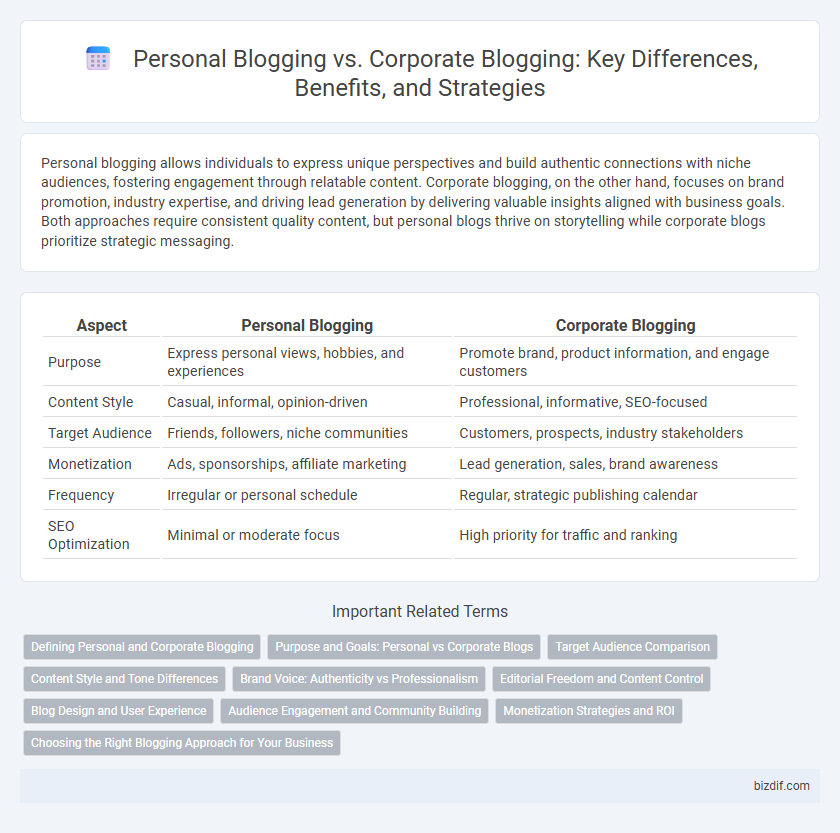Personal blogging allows individuals to express unique perspectives and build authentic connections with niche audiences, fostering engagement through relatable content. Corporate blogging, on the other hand, focuses on brand promotion, industry expertise, and driving lead generation by delivering valuable insights aligned with business goals. Both approaches require consistent quality content, but personal blogs thrive on storytelling while corporate blogs prioritize strategic messaging.
Table of Comparison
| Aspect | Personal Blogging | Corporate Blogging |
|---|---|---|
| Purpose | Express personal views, hobbies, and experiences | Promote brand, product information, and engage customers |
| Content Style | Casual, informal, opinion-driven | Professional, informative, SEO-focused |
| Target Audience | Friends, followers, niche communities | Customers, prospects, industry stakeholders |
| Monetization | Ads, sponsorships, affiliate marketing | Lead generation, sales, brand awareness |
| Frequency | Irregular or personal schedule | Regular, strategic publishing calendar |
| SEO Optimization | Minimal or moderate focus | High priority for traffic and ranking |
Defining Personal and Corporate Blogging
Personal blogging centers around individuals sharing their thoughts, experiences, and opinions, often fostering a direct connection with a niche audience. Corporate blogging represents a strategic marketing tool used by businesses to promote brand identity, engage customers, and provide industry insights. Both forms leverage content creation, but personal blogs emphasize authenticity and storytelling, whereas corporate blogs prioritize professionalism and targeted messaging.
Purpose and Goals: Personal vs Corporate Blogs
Personal blogs primarily focus on self-expression, sharing experiences, and building a community around individual interests, while corporate blogs aim to enhance brand visibility, drive sales, and establish industry authority. Personal bloggers often prioritize authenticity and engagement with a niche audience, whereas corporate blogs emphasize strategic content marketing, lead generation, and customer education. The distinct goals influence content style, frequency, and metrics for success, with personal blogs targeting emotional connection and corporate blogs focusing on measurable business outcomes.
Target Audience Comparison
Personal blogging primarily targets niche audiences interested in individual experiences, opinions, and storytelling, often appealing to like-minded readers seeking authenticity and personal connection. Corporate blogging targets broader, segmented audiences, including potential customers, industry professionals, and stakeholders, focusing on brand awareness, product information, and thought leadership. Understanding these audience differences helps tailor content strategies to maximize engagement and meet specific communication goals.
Content Style and Tone Differences
Personal blogging features a conversational and informal tone that reflects individual personality and experiences, often using storytelling and emotional language to engage readers. Corporate blogging maintains a professional, consistent style aligned with brand identity, focusing on clear, factual, and value-driven content to build authority and trust. The content style in personal blogs is flexible and varied, while corporate blogs emphasize strategic messaging and industry relevance.
Brand Voice: Authenticity vs Professionalism
Personal blogging emphasizes authenticity by showcasing the blogger's genuine voice, personal experiences, and unique perspectives, which builds trust and emotional connections with readers. Corporate blogging prioritizes professionalism, maintaining a consistent brand voice that aligns with company values, goals, and industry standards to reinforce credibility and authority. Balancing authenticity and professionalism influences audience engagement, brand perception, and overall content effectiveness in both blogging types.
Editorial Freedom and Content Control
Personal blogging offers complete editorial freedom, allowing individuals to express authentic opinions and explore diverse topics without restrictions. Corporate blogging demands strict content control to align with brand messaging, compliance standards, and marketing goals, often limiting spontaneous creativity. The degree of control directly influences content authenticity, audience engagement, and the overall communication strategy within each blogging style.
Blog Design and User Experience
Personal blogging often features a more flexible and creative blog design that reflects the author's personality, enhancing reader connection through unique layouts and interactive elements. Corporate blogging prioritizes professional, clean, and consistent design to reinforce brand identity, with user experience streamlined for easy navigation and clear calls to action. Responsive design, fast loading times, and intuitive interfaces are critical in both, but corporate blogs emphasize conversion-focused elements to support business goals.
Audience Engagement and Community Building
Personal blogging fosters authentic connections through relatable storytelling and direct interaction, enhancing audience engagement by creating a loyal community around shared interests. Corporate blogging prioritizes strategic content tailored to target demographics, using data-driven insights to optimize engagement and build brand communities. Both approaches leverage consistent communication and valuable content to sustain long-term audience loyalty and active participation.
Monetization Strategies and ROI
Personal blogging monetizes primarily through affiliate marketing, sponsored posts, and ad revenue, leveraging authentic content to build a loyal audience for targeted promotions. Corporate blogging focuses on lead generation, brand awareness, and customer retention, utilizing content marketing strategies that integrate with broader sales funnels and CRM systems to maximize ROI. Data shows corporate blogs typically achieve higher ROI by aligning content with strategic business goals and tracking conversion metrics more effectively than personal blogs.
Choosing the Right Blogging Approach for Your Business
Personal blogging offers an authentic voice that builds strong connections and trust with a niche audience, whereas corporate blogging emphasizes brand authority, SEO optimization, and lead generation through consistent, data-driven content. Choosing the right blogging approach depends on your business goals, target audience, and resources, with personal blogging ideal for entrepreneurs and small businesses seeking engagement, while corporate blogging suits larger organizations aiming for market penetration and scalability. Integrating personal storytelling within a corporate framework can enhance relatability while maintaining professionalism and strategic outreach.
Personal Blogging vs Corporate Blogging Infographic

 bizdif.com
bizdif.com